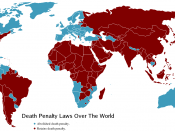The law is that thou shalt return from hence, to the place where thou camest, and from thence to the place of execution, where thou shalt hang by the neck till the body be dead, dead, dead and the Lord have mercy upon thy soul.
The eighteenth century is notorious for the creation of the Bloody Code (1618-1815) of capital laws in the English criminal legal system. The administration of justice and the importance of punishment to the maintenance of ruling class power in an urbanising and industrialising society led to this brutal code which imposed the death penalty for often trivial offences. But was the Bloody Code that bloody? Historians suggest that the Bloody Code was merely a death threat or terror based system that was not always enforced.
Change in England in the modern era is frequent and generally passes through parliament quite rapidly. History, however, is unlike the present.
Most things in English society remained the same for decades, and sometimes even centuries. Changes occurred infrequently and tended to occur over extended periods of time. The criminal justice system was no exception. Change was an agonisingly slow process and faced incredible opposition.
Citizens were against a special force of lawmen (or police) because of their suspicion towards soldiers during the Wars of the Roses (15th century) and Civil War (1642 - 1651). Their main fear was the possibility that a specialised force of lawmen may lead to further internal wars. Prior to the Bloody Code, Justices of the Peace and Petty Constables (pre-police) made up the only system of crime prevention. Their role, however, was not comparable to the law enforcement of today. A major crime unit was non-existent. Essentially the monarchs forced the justices behind the scenes to create statutes and government regulations and constables...


